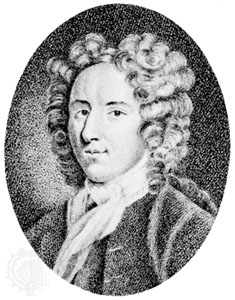“I hate all that don’t love me, and slight all that do.”
The Constant Couple (1699), Lure, Act i, Sc. 2.
George Farquhar fue un dramaturgo irlandés.
Era hijo de un clérigo. Estudió en el Trinity College de Dublín, pero abandonó sin obtener calificaciones, posiblemente para unirse a un grupo de actores. Su carrera estaba despegando, cuando un accidente en escena durante una representación de The Indian Emperor de John Dryden, en la que hirió a otro actor en una pelea a espada, hizo que abandonara la escena.
Abandonó Dublín por Londres en 1697, y su obra , Amor y una bofetada , se interpretó en el teatro de Drury Lane al año siguiente.
The Constant Couple se escribió cuando solo tenía veinte años. El éxito inesperado de la producción le convención de que intentara escribir de nuevo con Sir Henry Wildair y The Inconstant, or the Way to Win Him. Farquhar rápidamente tuvo seguidores, y en 1702 se casó con quien creía que sería una rica mecenas. Cuando descubrió, sin embargo, que ella también era pobre, se puso a trabajar para mantener a su nueva familia. En este período produjo: The Stage Coach y The Twin Rivals. Siguió siendo pobre, y decidió unirse al ejército, lo que le proporcionó material para una de sus mejores obras, El oficial reclutador . Poco después vino La estratagema de los pisaverdes , que fue escrita mientras vivía en Lichfield, Staffordshire. Pero el autor tenía mala salud, y murió dos meses después de su primera representación. Su última obra, completada mientras moría, está considerada como la mejor de las suyas. Fue en The Twin Rivals, sin embargo, la que contiene su frase más citada: , "Necessity, the mother of invention," .
Maestro del diálogo por el dominio y la naturalidad de sus producciones.
Wikipedia

“I hate all that don’t love me, and slight all that do.”
The Constant Couple (1699), Lure, Act i, Sc. 2.
“I believe they talked of me, for they laughed consumedly.”
The Beaux’ Stratagem (1707), Act iii. Sc. 1.
“Necessity, the mother of invention.”
The Twin Rivals (1702), Act i. Compare: "Necessity is the mother of invention", Wycherly, Love in a Wood (1672), act iii. sc. 3.; "Art imitates Nature, and necessity is the mother of invention", Richard Franck, Northern Memoirs (written in 1658, printed in 1694); "Magister artis ingenique largitor Venter" (translated: "Hunger is the teacher of the arts and the bestower of invention"), Persius, Prolog., line 10.
“T was for the good of my country that I should be abroad.”
The Beaux’ Stratagem (1707), Act iii. Sc. 2. Compare: "Leaving his country for his country’s sake", Fitz-Geffrey, The Life and Death of Sir Francis Drake (1596), stanza 213.; "True patriots all; for, be it understood, / We left our country for our country’s good", George Barrington, Prologue written for the opening of the Play-house at New South Wales, Jan. 16, 1796. New South Wales, p. 152.
“There is no scandal like rags, nor any crime so shameful as poverty.”
The Beaux’ Stratagem (1707), Arch, Act i, Sc. 1.
“Hanging and marriage, you know, go by destiny.”
The Recruiting Officer (1706), Braz, Act iii, Sc. 2.
“[T]hose who know the least, obey the best.”
The Recruiting Officer (1706), Act iv. Sc. 1.
Love and a Bottle (1698), Act iii, Sc. 2.